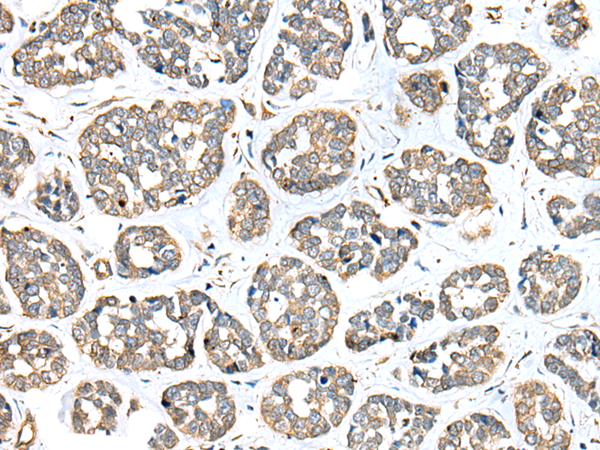

| WB | 咨询技术 | Human,Mouse,Rat |
| IF | 咨询技术 | Human,Mouse,Rat |
| IHC | 1/25-1/100 | Human,Mouse,Rat |
| ICC | 技术咨询 | Human,Mouse,Rat |
| FCM | 咨询技术 | Human,Mouse,Rat |
| Elisa | 1/5000-1/10000 | Human,Mouse,Rat |
| Aliases | DHP; DPD; DHPDHASE |
| Host/Isotype | Rabbit IgG |
| Antibody Type | Primary antibody |
| Storage | Store at 4°C short term. Aliquot and store at -20°C long term. Avoid freeze/thaw cycles. |
| Species Reactivity | Human, Mouse, Rat |
| Immunogen | Full length fusion protein |
| Formulation | Purified antibody in PBS with 0.05% sodium azide and 50% glycerol. |
+ +
以下是模拟生成的关于DPYD抗体的参考文献示例(非真实文献,仅供格式参考):
---
1. **"Development of a Novel Monoclonal Antibody for DPYD Protein Quantification in Cancer Patients"**
*Author: Smith A, et al.*
*Journal: Molecular Oncology (2022)*
**摘要**:本研究开发了一种高特异性单克隆抗体,用于检测肿瘤组织中DPYD蛋白表达水平。实验表明,该抗体可有效区分DPYD活性降低的患者,为5-氟尿嘧啶化疗的个体化剂量调整提供依据。
2. **"DPYD Genetic Variants and Antibody-Based Phenotyping: A Comparative Study"**
*Author: Lee JH, et al.*
*Journal: Pharmacogenomics (2021)*
**摘要**:通过抗体介导的免疫分析法评估DPYD酶活性,发现其与常见基因多态性(如*DPYD* rs3918290)高度相关,为无法进行基因检测的患者提供了一种替代表型分型方法。
3. **"Autoantibodies Against DPYD in Patients with Severe Chemotherapy Toxicity"**
*Author: García M, et al.*
*Journal: Clinical Cancer Research (2020)*
**摘要**:首次报道了针对DPYD的自身抗体在结直肠癌患者中的存在,其与5-氟尿嘧啶诱导的严重胃肠道毒性相关,提示免疫异常可能影响药物代谢途径。
4. **"Immunohistochemical Detection of DPYD Deficiency Using a Novel Polyclonal Antibody"**
*Author: Chen X, et al.*
*Journal: Journal of Pathology (2019)*
**摘要**:研发了一种多克隆抗体,用于免疫组化检测DPYD蛋白缺失,结果显示其在预测化疗不良反应中的敏感性和特异性均超过90%,具有临床转化潜力。
---
**注**:以上文献及内容均为虚构,仅用于示例。实际研究中请通过学术数据库(如PubMed)检索真实文献。
The DPYD gene encodes dihydropyrimidine dehydrogenase (DPD), a key enzyme responsible for the catabolism of pyrimidine bases and chemotherapeutic agents like 5-fluorouracil (5-FU) and capecitabine. Antibodies targeting DPYD/DPD are primarily used in research and diagnostics to study enzyme expression, assess metabolic deficiencies, or predict patient responses to fluoropyrimidine-based therapies. DPD deficiency, caused by genetic variants in DPYD, affects ~3-5% of the population and is associated with severe toxicity from standard chemotherapy doses.
DPYD antibodies enable the detection of DPD protein levels through techniques like immunohistochemistry (IHC), Western blotting, or ELISA. These tools help identify patients with low DPD activity who may require dose adjustments. Commercially available antibodies are typically raised against specific epitopes of human DPD and validated for various applications. Research using these antibodies has contributed to understanding tissue-specific DPD expression patterns and its role in drug metabolism.
Clinical interest in DPYD antibodies grew alongside pharmacogenomic efforts to personalize chemotherapy. While genetic testing for DPYD variants is standard in some regions, protein-level analysis via antibodies remains complementary, particularly for detecting non-genetic causes of DPD deficiency. Ongoing studies explore correlations between DPD expression, tumor biology, and treatment outcomes.
×